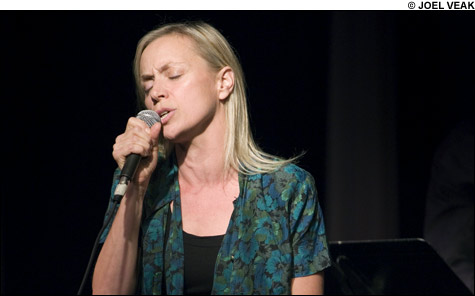
THEOLOGY: Dominique Eade can fill a club even when the Red Sox are in the playoffs. |
WFNX Jazz Brunch Top 5
1. Herbie Hancock, River: The Joni Letters [Verve]
2. Dee Dee Bridgewater, Red Earth: A Malian Journey [Emarcy]
3. James Taylor Quartet, Don’t Mess With Mr. T [Dome]
4. Miles Davis, Complete on the Corner Sessions [Legacy]
5. Manu Katche, Playground [ECM] |
Sometimes there is a God. The Red Sox were playing the first game of their ALDS with the Angels, but Dominique Eade had a nearly full house.That’s as it should be. You can forget how small a town this is until you see a great artist playing to half a house midweek and write it off to — what, a theater show across town? A competing performer? The Game?
So it was great to see Eade playing to a good crowd at Scullers on a Wednesday night. Now in her late 40s, she’s long been one of the finest singer-composer-bandleaders in jazz. Her latest album, Open (a duo session with pianist Jed Wilson), showed her reaching a new peak in her own writing, combining the directness of folk pop with the harmonic and rhythmic sophistication of jazz. She brought with her to Scullers one of her finely calibrated small ensembles: saxophonist Jeremy Udden, guitarist Brad Shepik, bassist Kim Cass, and drummer John Hadfield. The tonal palette gave her flexibility, and Hadfield plays mostly hand drums (with a patter of cymbal) — plenty of rhythm, but nothing to cloud her delivery of lyrics.
From the first moments, she was walking a high wire, delivering a few bars a cappella, no supporting instrument for harmonic grounding, no net: “Don’t turn away/Can’t you see there’s an amber light still shining in the window/Where we left it long, long ago.” Then Shepik came in with grounding chords, and then the band with Udden playing soprano in unison with Eade. Her risk-taking leaps of register, her explorations of odd corners of harmony, her running ahead of the beat and falling back — these threatened to tip her off balance all night, but she always found her footing. Her clean delivery of lyrics melted at will into scatting, sometimes within the space of a phrase, as on a very up-tempo “Yesterdays.” She sang two songs from Ray Charles’s Modern Sounds in Country and Western Music, “It Makes No Difference Now” (dedicated to her mentor, Ran Blake, sitting in the front row) and “Here We Go Again.” A few times she favored samba beats (her own “Open Letter,” with its “Waters of March” bridge). When she scatted, her improvisations were horn-like in their freedom and imagination. On a duo with Cass, she matched his bass patterns and portamenti with her own, and they conjured the great duo of Sheila Jordan and Harvie Swartz. Several times during the night she brought her voice up to an impossibly high note and let it hang in the air, pianissimo. Eade’s is not a big or rich voice, but it’s a pure, gleaming one that on ballads opens up into a warm vibrato. Throughout the night, she affectionately razzed her musicians, (“This one is for YOU, Jeremy, don’t tell me you can’t find the chart!”) Good as she is, her humor and down-to-earth glamor are lagniappe.
The second of my two nights out demonstrated jazz’s inexhaustible variety: two guitarist-led bands with completely different agendas. In Boston — a guitar-mad town — the draw is the star soloist. All the guitar geeks want to see Metheny shred and watch Sco dig into those thirds. John Scofield was indeed in the city for two nights at the Regattabar; Michael Musillami played Thursday at MIT’s Killian Hall. Both were impressive soloists, but their writing and band concepts were as important as their individual playing.
Musillami writes tricky pieces — multiple lines, contrary rhythmic motion, varied textures. The compositions are important, but they’re pretty much inseparable from his band’s performance of them. At MIT he had his usual trio with bassist Joe Fonda and drummer George Schuller, plus violinist Mark Feldman. (All are on Musillami’s new Playscape release, The Treatment.) There were wide open spaces, extended passages of indeterminate meter and tempo — “free jazz,” if not for all the written parts, the arrangement of ensemble shifts, and the solo entrances.
Musillami doesn’t write standard verse-chorus song forms — when his pieces are really chugging along, they’re all hook, usually based on a deep ostinato groove that gets passed around as the players trade solos. The head of “The Treatment” is a set of repeated angular triplets, with a drum break and short bridge section. But at MIT the solo sections settled into a syncopated four-note ostinato, and by the time the solo sequence came around to Fonda, he was deep into it. His extended solo was like an object lesson in motivic development — he solo’d in and around that groove, built big runs off it, reversed direction when he and Schuller fell into bashing triplet quarter notes. By the end of the piece he was barely suppressing a coughing fit, but it was so apposite that the coughs could have been part of the score.